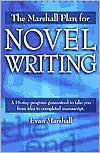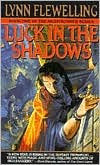Wednesday, May 17, 2006
A Note on the Appendices
I welcome comments on the wisdom of including (or not including) appendices with fantasy novels.
I am considering having three appendices. I have started work on them this week based on notes I made before and while working on the completed draft. I figure I should leave them as ongoing projects since the information in them is subject to change while I do extensive editing of the draft. I can wrap them up in the final phase of editing.
FIRST APPENDIX: MYTHOLOGY
There are two religious groups in the novel. I am not giving anything away that isn't in the blurb for the back cover. There are the wizards, who represent commonly accepted religious views, and the Mystics, a heretical group with alternative views. They each have their own version of history and the role of the gods and these two views are in conflict.
I thought of having a table to show the progression of history over the Ages in brief summary, the whole thing fitting on one printed page. The history focuses on what the gods were doing, what people were doing, and what went wrong in the world that brought an end to each Age, and how each new Age was started with a new plan to fix things. I'm working now to simplify this information, considering reducing the number of ages, etc. There are only three in the novel, but even that seems a bit confusing to me and I wrote it. This is information that should be quick and easy to grasp, easy to remember, and not interfere with the flow of the story. For those readers interested in more detail, I thought a few brief comments in an Appendix would be useful.
SECOND APPENDIX: NOTES ON LANGUAGE
There is a constructed language in the novel (see link in the sidebar for more information on Constructed Languages). It is called "the secret language of the Mystics" and it is their ancient tongue, known now only by them. There are only a few quotes in the language in the entire novel, so it's no great burden for the typesetter. I'd like to include some basic information on the language I created for this novel, nothing too esoteric but enough to give some insight into the inflectional system.
As an aside, I love language, have studied several, and enjoy creating them as a hobby, something I've done since I was 13 years old. That was when I began reading intensely about language, history and culture, things I'm still passionately interested in. Though I'm not a genius, I was something of a child prodigy -- they considered sending me to college at age 14. I loved reading about Tolkien's languages and histories in the appendices to The Lord of the Rings, though they were not what influenced me to create such things on my own: I had already been doing that for a couple of years before I finally discovered and read the LotR in high school.
THIRD APPENDIX: GLOSSARY OF NAMES, PLACES, EVENTS, ETC.
I have already completed the update of the glossary, giving brief descriptions of each named character, no matter how minor, as a reminder of their role or what action they performed or scene they were in. I also list words referring to groups as well as place names and the names of important events, ones that the characters themselves give in the story.
I'm not sure that I'll actually include the three appendices, but I'm thinking seriously about it. I think it's fun to see such things at the back of a book. If nothing else, these notes are helpful to me, but I think some readers enjoy seeing these types of notes included with a fantasy novel.
Adrian
Subscribe to:
Post Comments (Atom)








4 comments:
Hi, Adrian...recently discovered your blog by way of Devon's and have enjoyed following your progress. In writing my fantasy novel, while developing the naming convention, I also found myself naming other things besides the people so now I'm designing a language for the Raevani. Two actually--one is an ancient mystical language. Thanks for the link to Constructed Languages. d:)
Thanks for your comment, Debra! I like the name -- Raevani -- that's really a cool name. Almost Latin. Weren't there Rhaetones at one time? Some people in the ancient world. If you follow the links you find at the Constructed Languages link (scroll to the bottom of the Wikipedia entry), you will find other excellent sites of interest.
Good luck with your languages and your novel!
Rhaetones? Well I didn't know that. The imaginary setting of my novel (A Lamentation of Swans) is the land of Raeve, hence... Another thing I meant to say was I admire the disciplined method you've developed. I'm working out a system for myself so I can complete the writing of Swans, and I like the idea of planning one book while editing another. But I've got an awful commute and it's hard to manage what little time I have and write productively.
Thanks for the good wishes! d:)
I can certainly relate to the frustration of wanting to write but not always having the time or the energy for it, or the energy when you have the time, or the time when you have the energy. As you know, it just takes patience, and realizing the natural flow of things, and making use of time creatively, and a lot of tenacity.
Usually I like to write in longer blocks, but I have found I can do a lot if I have just one hour of quiet, focused time. If I can find that two or three times throughout the course of a day it's enough to make substantial progress day by day.
I've also found that I can sometimes write even when very tired, as long as I can remain alert mentally to draw on enough creativity to handle the specific writing task.
Certainly, the more I write, and the more I stick with it, the easier and easier it gets. It becomes routine, automatic, like breathing, and I can quickly get right into it rather than spending large amounts of time rereading to get back in the mindset before actually starting to write.
It's also important not to overdo. When I fill every available moment of the morning, day, evening and night with other activities plus writing, after some days go by I'm screaming for a break. Sleep definitely helps!
Especially with a long commute.
I'm not sure of the word "Rhaetones" but I believe I have seen something like that in the history books. Also I know there were the "Ingvaeones" and others. These might have been ancient Germanic tribes reported on by Tacitus or something. Intriguing to try to remember where I've seen them before. They are of no relevance to your novel, of course, but it's interesting that you came up with a name that sounds like it belongs in the history books. Sounds like an ancient Swiss tribe to me, one that held off the Romans!
Good luck with your novel!
Post a Comment